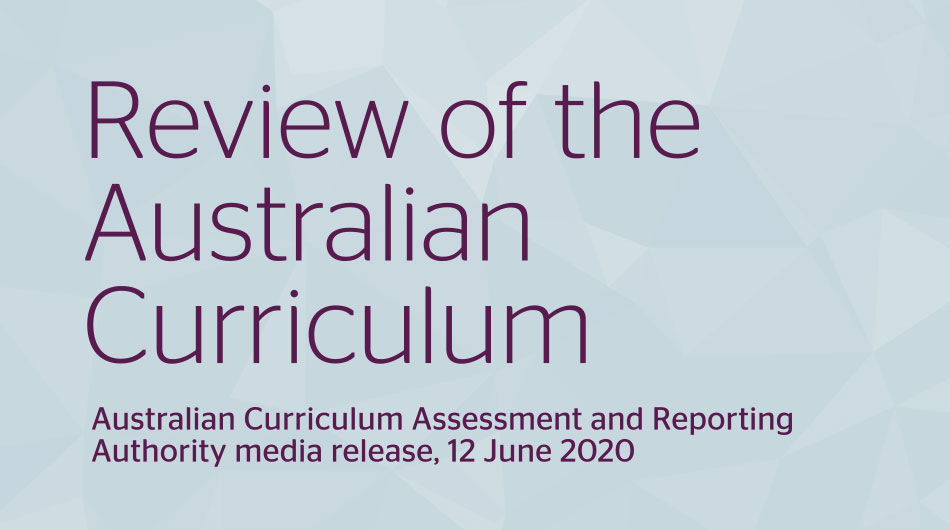See also ‘From the President’ at the start of this newsletter for information about HEIA(Q)’s involvement in the review.
Today, education ministers have agreed to terms of reference for the review of the Foundation–Year 10 (F–10) Australian Curriculum, with the review to be completed by the start of 2022.
“We welcome the opportunity to ensure the national curriculum continues to meet the needs of students. The Australian Curriculum is well regarded, however, as it has been in place for some years now, it is timely that it be reviewed,” said ACARA CEO, David de Carvalho.
“Teachers have told us that, particularly in primary years, the Australian Curriculum is overcrowded and does not allow enough time to teach for deep understanding of core concepts or application of knowledge in the learning areas.
“Schools and teachers want a less crowded curriculum, one that provides flexibility and scope for greater depth of learning—and a more helpful curriculum, one that provides more meaningful connections within and across its three dimensions,” said Mr de Carvalho.
In preparing for the review, ACARA has been consulting with key education stakeholders to define the approach to, and scope of, the review. Through its program of research, ACARA has benchmarked the Australian Curriculum against the curricula of Singapore, Finland, British Columbia and New Zealand, and sought feedback from states and territories on the effectiveness of the Australian Curriculum through its annual monitoring process. This work has informed the terms of reference agreed by education ministers.
The overall finding from ACARA’s program of research is that there is no need, nor support for, a major overhaul of the F–10 Australian Curriculum, but there is broad-based recognition that the current curriculum needs refining, updating and ‘decluttering’ to better support teachers with implementation.
“Feedback strongly supports the need to balance curriculum stability for schools implementing the Australian Curriculum with the need to ensure the curriculum is kept up to date and fit for purpose,” said David de Carvalho.
The focus of the review will be on content refinement within the existing structure and dimensions of the Australian Curriculum.
The review will involve extensive consultation with the profession, and engagement with key stakeholders. In particular, the review will respond to the needs and feedback of teachers, and teachers will be extensively involved in the review process.
ACARA will review and make any necessary content refinements to the Australian Curriculum in all learning areas from Foundation to Year 10 by the end of 2021 and, subject to ministerial approval, will publish the next version of the Australian Curriculum on an improved website in 2022.
For more information see the ACARA website: www.acara.edu.au/curriculum/curriculum-review
FAQ
The following FAQs are an extract from a larger set of FAQs on the ACARA website www.acara.edu.au/curriculum/curriculum-review
What is the purpose of the review?
The Australian Curriculum has been in place for some time now, and education ministers have agreed it is timely that it be reviewed to ensure it continues to meet the needs of students now and into the future. The aim of the review is to improve the Australian Curriculum from Foundation to Year 10 by refining, realigning and reducing the existing content of the curriculum.
What is the scope of the review? Which areas of the Australian Curriculum will be reviewed?
All eight learning areas from Foundation to Year 10 will be reviewed by the end of 2021, although the review of all 16 Languages subjects will take longer, with Chinese, French, Italian and Japanese completed first, by the end of 2021, and the other languages completed by 2023.
Why is the curriculum being reviewed now?
The Australian Curriculum has been in place for some time now and was last reviewed in 2014. In 2015, education ministers agreed that ACARA should undertake a six-year cycle of review of the Australian Curriculum to ensure it continues to meet the needs of students and it is best practice. The scope of the review has been informed by ACARA‘s research program, which included:
- benchmarking the Australian Curriculum against the curricula of the education systems of Singapore, Finland, British Columbia and New Zealand
- annual monitoring of the effectiveness of the Australian Curriculum with feedback from states and territories
- participation in international projects such as the OECD 2030 Future of Education and Skills project
- ongoing feedback from education authorities and teachers.
How can I input into this review?
There will be broad consultation with stakeholders throughout the review process. ACARA is not calling for public submissions to this review, however, the timeline includes two formal windows for open stakeholder and public feedback on the proposed changes to the curriculum content. The review timeline PDF 3 mb shows when these public comment windows will occur, and updated information will be regularly added to this webpage.
Will individual teachers be involved?
The views and experiences of teachers are key to the review process. There will be opportunities for consultation with teachers throughout the process, through local state/territory and sector forums and mechanisms such as professional teacher associations. We are also establishing new reference groups for each learning area, made up of teacher representatives from all state and territories, and the non-government sectors. The review timeline includes two formal windows for stakeholder feedback on the proposed changes to the curriculum content during 2021, where we hope many teachers will provide their feedback.

